新目标八年级下册各单元知识点及语法
新目标英语八年级下册Unit1Willpeoplehaverobots知识点
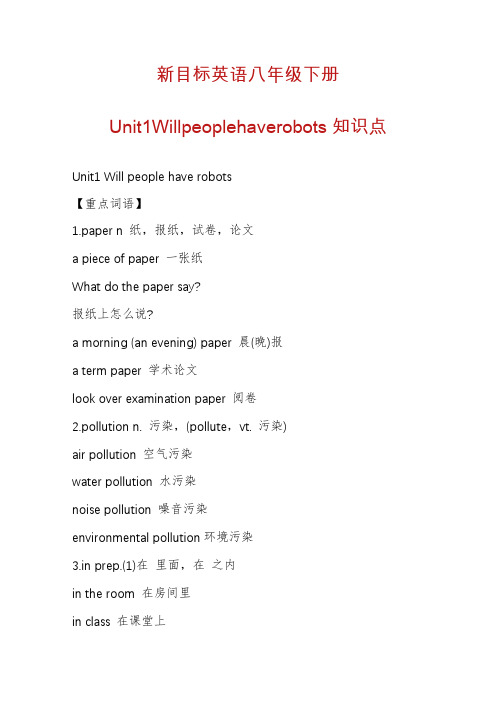
新目标英语八年级下册Unit1Willpeoplehaverobots知识点Unit1 Will people have robots【重点词语】1.paper n 纸,报纸,试卷,论文a piece of paper 一张纸What do the paper say?报纸上怎么说?a morning (an evening) paper 晨(晚)报a term paper 学术论文look over examination paper 阅卷2.pollution n. 污染,(pollute,vt. 污染)air pollution 空气污染water pollution 水污染noise pollution 噪音污染environmental pollution环境污染3.in prep.(1)在里面,在之内in the room 在房间里in class 在课堂上(2)在(某段时间)之间in the morning 在早上in the past 在过去I′ll come back in a day or two我过一两天就会回来in,after,later 接时间段,都可表示“(一段时间)之后”,它们有什么区别呢?①“in+一段时间”指“(将来的)一段时间之后”。
What will you be in five years?五年之后你干什么?We’ll start off in ten minutes.我们十分钟后出发。
②“after+一段时间”或“一段时间+later”表示“(在过去某个时间看来)一段时间之后”。
He went home after two days.他两天后回家了。
Three years later,she had a baby.三年后,她生了一个婴儿。
4.less adj. 较少的;少量的(little的比较级)They buy less beer and fewer cigarettes now现在他们买的啤酒和香烟比以前少了。
八年级下册英语知识点[新目标八年级英语知识点总结]
![八年级下册英语知识点[新目标八年级英语知识点总结]](https://img.taocdn.com/s3/m/fb83419d50e79b89680203d8ce2f0066f53364ab.png)
新目标八年级英语知识点总结新目标八年级英语知识点总结(一) 1、too…to… (1)too…to句型,形式上是肯定的,但表达否定意义,意为“太…而不能…”。
too后接形容词或副词的原级,to后接动词不定式。
He i too young to go to chool. 他太小了而不能去上学。
(2)too…to…表否定意义时,可与o…that…或not enough to互换。
1)too…to…结构同o…that结构的互换。
too…to…结构是一个简单句;而o…that是一个复合句,o后接形容词或副词,that 后接从句。
转换时that后的从句要用否定形式。
The man i too old to go to work. = The man i o old that he can’t go to work. 这个人岁数太大,不能去工作了。
2)too…to…结构同not…enough to…结构的互换。
enough前的形容词或副词必须与too后的形容词或副词意义相反。
The bo某 i too heavy for him to lift. = The bo某 i not light enough for him to lift.这个盒子太重了,他拿不动。
(3)too…to…句型在以下三种情况下表达肯定意义。
1)当too前有not;never;nothing等表示否定意义的词时,too…to…就不表示否定意义。
One i never too old to learn. 活到老,学到老。
2)如果too…to…结构前出现了only,则加强肯定语气,就无否定意义了。
only too 相当于very或very much。
I hall be only too pleaed to go home. 我将非常高兴地回家。
3)当too后有ad;happy;glad;pleaed等表示情感的形容词,则表示肯定意义。
He i too ad to hear the tory. 听到这个故事,他感到太伤心了。
(人教新目标)八年级英语(下)短语语法知识点汇总Unit9
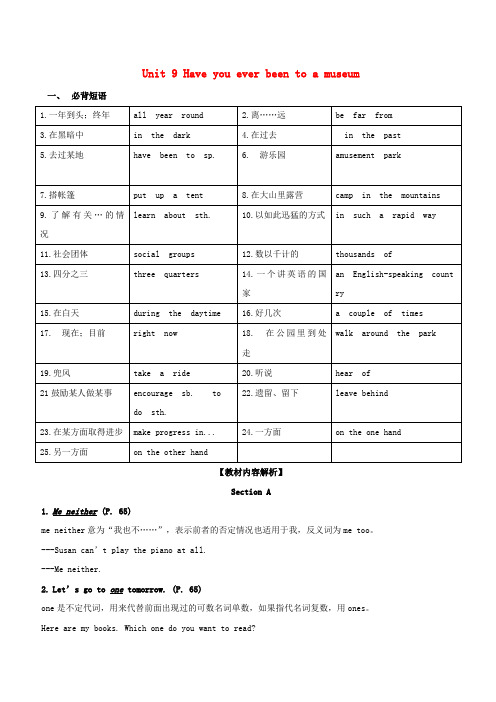
Unit 9 Have you ever been to a museum 一、必背短语【教材内容解析】Section A1.Me neither (P. 65)me neither意为“我也不……”,表示前者的否定情况也适用于我,反义词为me too。
---Susan can’t play the piano at all.---Me neither.2.Let’s go to one tomorrow. (P. 65)one是不定代词,用来代替前面出现过的可数名词单数,如果指代名词复数,用ones。
Here are my books. Which one do you want to read?---I don’t like these dresses.---How about those ones over there.3.Let’s go somewhere different today. (P. 65)somewhere用作副词,表示“在某处、到某处”,常用于肯定句中,在否定句和疑问句中用anywhere。
It’s cold here. Let’s go somewhere else.Did you go anywhere last Sunday?4.They are going to take the subway. (P. 66)take the subway意为“乘地铁”,take用作动词,可以表示“乘、坐(车、船等)”。
We take the subway to work every day.5.It’s a great way to spend a Saturday afternoon. (P. 66)(1) way表示“方法”时,后常接动词不定式或者of doing作定语。
Can you think out a way to open the door/of opening the door?(2) spend的用法① sb. spend+时间/金钱+on sth. “在某事上花费多长时间或者多少钱”The man spent the whole day on his speech.The family spent 10,000 dollars on their trip.② sb. spend+时间+(in) doing sth. “花费多长时间做某事”The boy has spent two hours playing the computer games.【拓展】辨析spend, pay, take和cost6.We put up a tent and cooked outside. (P. 66)put up意为“搭建”,还可以表示“举起、张贴”。
人教新目标版八年级下册Unit2 I'll help to clean up the city parks单元知识点

Unit 2 I’ll help to clean up the city parks.课时 1 Section A(1a-2d)学习目标:一、掌握动词短语clean up, cheer up 的用法。
(重点)二、能用could, can’t, will等情态动词给出建议。
课堂导学:1.You could help to clean up the city parks.Clean up 为动副短语,意为“打扫干净”。
若后接代词作宾语,代词应放在clean和up中间;若后接名词作宾语,名词可放在两次之间或up之后。
She cleaned up the broken glass on the floor.即学即练一根据汉语意思完成句子我的房间很脏,所以我必须把它打扫干净。
My room is very dirty, so I have to .2.The girl could visit the sick kids in the hospital to cheer them up.短语2:cheer up使高兴;使振奋。
后接代词作宾语时,代词应放在cheer up中间.She failed the exam, and we want to cheer her up.即学即练二单项选择The child looked sad. Let’s .(选出与划线部分意思相同或相近的选项)A. happyB. make him happyC. shoutD. give help3.The boy could give out food at the food bank.短语3:give out 分发;散发;发放give out 是动副短语,意为“分发;散发;发放”,后接名词作宾语时,名词可放在短语后面,也可放在短语中间;后接代词作宾语时,代词只能放在短语中间。
其同义短语为“hand out”。
I saw a man giving out leaflets in the street.Give them out before class begins.即学即练三单项选择-Would you like to help me to the papers to the students, Tom?-Certainly, Miss Wang.A.give upB. give offC. give outD. give in4. We could put up signs.短语4:put up张贴;搭建Put up在该句中意为“张贴(布告)等”,此外它还可表示“公布;搭建;举起(手)等”。
新目标八年级下册英语各单元重点语法汇总

新目标八年级下册英语各单元重点语法汇总一. 询问健康及麻烦的表达方法1. 常用结构:What’s the matter (with sb.)?(sb.)怎么了?What’s wrong (with sb.)?(sb.)怎么了?What’s the trouble with sb? sb.出什么事了?What happened to sb? sb.发生了什么事?Are you OK? 你没事吧?Is there anything wrong with sb.?sb.有不舒服/麻烦吗?2. 要表达身体疼痛或不舒服,可用以下结构:①sb. have/has 病症The twins have colds.双胞胎感冒了。
②sb.have/has a headache/toothache/stomachache/backache. She had a stomachache last night. 她昨晚肚子痛。
③sb. have/has a sore 发病部位He has a sore throat. 他喉咙痛。
④sb. hurt(s) 身体部位或反身代词He hurt his leg. 他的腿受伤了。
⑤某部位hurt(s).My head hurts badly. 我头痛得厉害。
⑥sb. have/has a pain in one’s 身体部位I have a pain in my chest. 我胸口痛。
⑦(There is) something wrong with one’s 身体部位There is something wrong with my right eye. 我的右眼有毛病。
⑧其他表达方式She has a heart trouble. 她有心脏病。
He got hit on the head. 他头部受到了撞击。
She cut her finger. 她割破手指了。
二.情态动词should1. should为情态动词,意为“应该;应当”,否定式为shouldn’t,其后接动词原形,无人称和数的变化。
人教新目标八年级英语下册期中课本Units 1-6 知识点总结
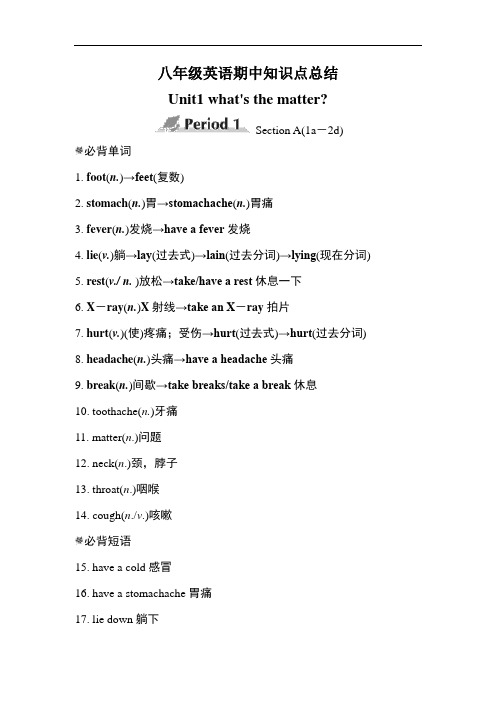
八年级英语期中知识点总结Unit1 what's the matter?Section A(1a-2d)必背单词1. foot(n.)→feet(复数)2. stomach(n.)胃→stomachache(n.)胃痛3. fever(n.)发烧→have a fever发烧4. lie(v.)躺→lay(过去式)→lain(过去分词)→lying(现在分词)5. rest(v./ n. )放松→take/have a rest休息一下6. X-ray(n.)X射线→take an X-ray拍片7. hurt(v.)(使)疼痛;受伤→hurt(过去式)→hurt(过去分词)8. headache(n.)头痛→have a headache头痛9. break(n.)间歇→take breaks/take a break休息10. toothache(n.)牙痛11. matter(n.)问题12. neck(n.)颈,脖子13. throat(n.)咽喉14. cough(n./v.)咳嗽必背短语15. have a cold感冒16. have a stomachache胃痛17. lie down躺下18. take one's temperature量体温19. sound like听起来像20. take breaks=take a break休息必背句子21. What's the matter?怎么了?22. Yeah, I think I sat in the same way for too long without moving.是啊,我认为我是以同样的姿势坐着不动的时间太长了。
23. If your head and neck still hurt tomorrow, then go to a doctor.如果明天你的头和脖子还疼的话,就去看医生吧。
新目标英语八年级下Unit 1 What’s the matter语法知识点重点短语
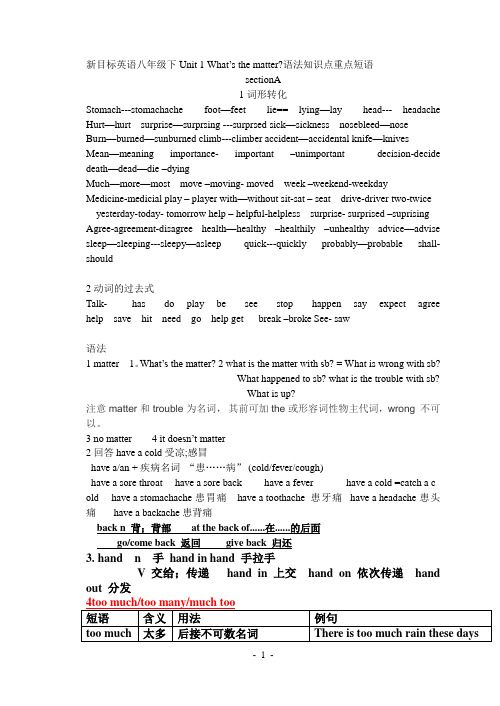
新目标英语八年级下Unit 1 What’s the matter?语法知识点重点短语sectionA1词形转化Stomach---stomachache foot—feet lie== lying—lay head--- headache Hurt—hurt surprise—surprsing ---surprsed sick—sickness nosebleed—nose Burn—burned—sunburned climb---climber accident—accidental knife—knives Mean—meaning importance- important –unimportant decision-decide death—dead—die –dyingMuch—more—most move –moving- moved week –weekend-weekdayMedicine-medicial play – player with—without sit-sat – seat drive-driver two-twice yesterday-today- tomorrow help – helpful-helpless surprise- surprised –suprising Agree-agreement-disagree health—healthy –healthily –unhealthy advice—advise sleep—sleeping---sleepy—asleep quick---quickly probably—probable shall- should2动词的过去式Talk- has do play be see stop happen say expect agree help save hit need go help get break –broke See- saw语法1 matter 1。
2020年春人教新目标英语八年级下册Unit4-5知识点总结

2020年春人教新目标英语八年级下册Unit 4 Why don’t you talk to your parents?1..用于提建议的句型有:What about doing sth ?=How about doing sth?(1). 同意对方的建议时,一般用:….怎么样?.Let’s do sth . 让我们一起做某事吧。
Shall we/I do sth? 我们做…好吗?had better do/not do sth 最好做/不做某事Will/Would you please do sth 请你做…好吗?Would you like to do sth? 你想去做某事吗?Would you mind doing sth?你介意做某事吗?Why don’t you do sth?= Why not do sth?为什么不呢?◆Good idea./ That’s good idea. 好主意◆OK/ All right./ Great 好/ 行/太好了◆Yes, please ./ I’d love t o 是的/ 我愿意◆I agree with you 我同意你的看法◆No problem 没问题◆Sure/ Of course/ Certainly 当然可以◆Yes, I think so 对,我也这样想(2).对对方的帮助或要求表示委婉谢绝时,一般用:◆I don’t think so 我认为不是这样◆Sorry, I can’t对不起,我不能◆I’d love to, but…◆I’m afraid…我愿意,但恐怕……2. allow doing sth 允许做某事allow sb. to do sth 允许某人做某事be allowed to do sth 被允许做某事allow与let的辨析:allow指“允许”,表示“默许,听任,不加阻止”,allow sb to do sth 允许某人做某事。
2020年春人教新目标英语八年级下册 Unit1 单元知识点总结全解
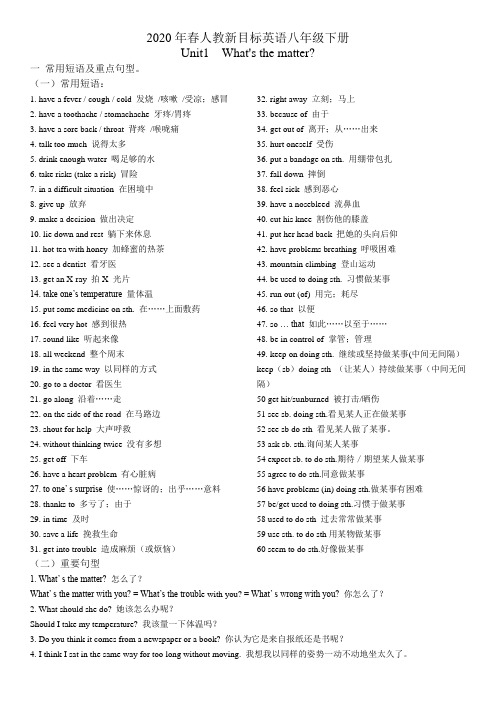
2020年春人教新目标英语八年级下册Unit1 What's the matter?一常用短语及重点句型。
(一)常用短语:1. have a fever / cough / cold 发烧/咳嗽/受凉;感冒2. have a toothache / stomachache 牙疼/胃疼3. have a sore back / throat 背疼/喉咙痛4. talk too much 说得太多5. drink enough water 喝足够的水6. take risks (take a risk) 冒险7. in a difficult situation 在困境中8. give up 放弃9. make a decision 做出决定10. lie down and rest 躺下来休息11. hot tea with honey 加蜂蜜的热茶12. see a dentist 看牙医13. get an X-ray 拍X 光片14. take one’s temperature 量体温15. put some medicine on sth. 在……上面敷药16. feel very hot 感到很热17. sound like 听起来像18. all weekend 整个周末19. in the same way 以同样的方式20. go to a doctor 看医生21. go along 沿着……走22. on the side of the road 在马路边23. shout for help 大声呼救24. without thinking twice 没有多想25. get off 下车26. have a heart problem 有心脏病27. to one’ s surprise 使……惊讶的;出乎……意料28. thanks to 多亏了;由于29. in time 及时30. save a life 挽救生命31. get into trouble 造成麻烦(或烦恼)32. right away 立刻;马上33. because of 由于34. get out of 离开;从……出来35. hurt oneself 受伤36. put a bandage on sth. 用绷带包扎37. fall down 摔倒38. feel sick 感到恶心39. have a nosebleed 流鼻血40. cut his knee 割伤他的膝盖41. put her head back 把她的头向后仰42. have problems breathing 呼吸困难43. mountain climbing 登山运动44. be used to doing sth. 习惯做某事45. run out (of) 用完;耗尽46. so that 以便47. so … that 如此……以至于……48. be in control of 掌管;管理49. keep on doing sth. 继续或坚持做某事(中间无间隔)keep(sb)doing sth (让某人)持续做某事(中间无间隔)50 get hit/sunburned 被打击/晒伤51 see sb. doing sth.看见某人正在做某事52 see sb do sth 看见某人做了某事。
新版新目标英语八年级下册Unit5知识点总结
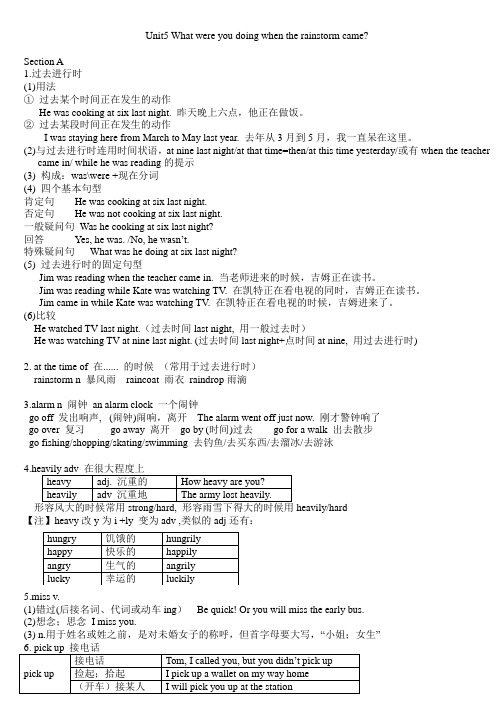
Unit5 What were you doing when the rainstorm came?Section A1.过去进行时(1)用法①过去某个时间正在发生的动作He was cooking at six last night. 昨天晚上六点,他正在做饭。
②过去某段时间正在发生的动作I was staying here from March to May last year. 去年从3月到5月,我一直呆在这里。
(2)与过去进行时连用时间状语,at nine last night/at that time=then/at this time yesterday/或有when the teachercame in/ while he was reading的提示(3) 构成:was\were +现在分词(4) 四个基本句型肯定句He was cooking at six last night.否定句He was not cooking at six last night.一般疑问句Was he cooking at six last night?回答Yes, he was. /No, he wasn’t.特殊疑问句What was he doing at six last night?(5) 过去进行时的固定句型Jim was reading when the teacher came in. 当老师进来的时候,吉姆正在读书。
Jim was reading while Kate was watching TV. 在凯特正在看电视的同时,吉姆正在读书。
Jim came in while Kate was watching TV. 在凯特正在看电视的时候,吉姆进来了。
(6)比较He watched TV last night.(过去时间last night, 用一般过去时)He was watching TV at nine last night. (过去时间last night+点时间at nine, 用过去进行时)2. at the time of 在...... 的时候(常用于过去进行时)rainstorm n 暴风雨raincoat 雨衣raindrop雨滴3.alarm n 闹钟an alarm clock 一个闹钟go off 发出响声, (闹钟)闹响,离开The alarm went off just now. 刚才警钟响了go over 复习go away 离开go by (时间)过去go for a walk 出去散步go fishing/shopping/skating/swimming 去钓鱼/去买东西/去溜冰/去游泳heavily/hard【注】heavy改y为i +ly 变为adv ,类似的adj还有:5.miss v.(1)错过(后接名词、代词或动车ing)Be quick! Or you will miss the early bus.(2)想念;思念I miss you.(3) n.用于姓名或姓之前,是对未婚女子的称呼,但首字母要大写,“小姐;女生”7.strange adj. 奇怪的 →strangely adv 奇怪地 →stranger n 陌生人8. With no light outside, it felt like midnight. 外面没有一丝光亮,让人感觉这是在午夜。
人教版新目标八年级下册1-5单元_英语语法知识点精讲+练习.docx

Peter told me he _____
(be)bored yesterday.
3.
She said she _____(go)swimming last Sunday.
4.
Bobby said he _____
(may)call me later.
5.
Antonio told me he _____
(have)a party.
3.
When I _____(come)into the classroom, she ________ ______
(read)a storybook.
4.
She _____ ______(play)computer games while her mother ____ ______
(Mike)
4. I’m having a surprise party for Lana.
(she)
(五)if引 的条件状 从句
构:if+一般 在 ,主 +将来
含 :如果⋯⋯,将要⋯⋯
例如:If you ask him, he will help you.
如果你 求他,他会帮助你。
Ifneed be, we’ll work all night.
答案:1. should 2. shouldn’t3. should 4. should 5. should(三) 去 行
去 行 表示 去某一点 正在 行的 作或者 去某一段 内一直 行的 作。
1.构成
was /were + doing,例如:
I was watchingTV at 9 o’clock last night.
(cook)yesterday
人教新目标八年级英语下册Unit 2 知识点总结
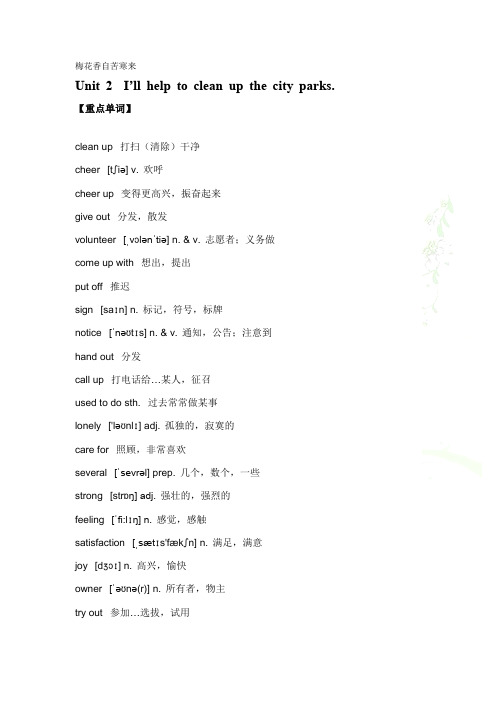
梅花香自苦寒来Unit 2 I’ll help to clean up the city parks.【重点单词】clean up 打扫(清除)干净cheer [tʃiə] v. 欢呼cheer up 变得更高兴,振奋起来give out 分发,散发volunteer [ˌvɔlənˈtiə] n. & v. 志愿者;义务做come up with 想出,提出put off 推迟sign [saɪn] n. 标记,符号,标牌notice [ˈnəʊtɪs] n. & v. 通知,公告;注意到hand out 分发call up 打电话给…某人,征召used to do sth. 过去常常做某事lonely ['ləʊnlɪ] adj. 孤独的,寂寞的care for 照顾,非常喜欢several [ˈsevrəl] prep. 几个,数个,一些strong [strɒŋ] adj. 强壮的,强烈的feeling [ˈfi:lɪŋ] n. 感觉,感触satisfaction [ˌsætɪs'fækʃn] n. 满足,满意joy [dʒɔɪ] n. 高兴,愉快owner [ˈəʊnə(r)] n. 所有者,物主try out 参加…选拔,试用journey ['dʒɜ:nɪ] n. (尤指长途)旅行,行程raise [reɪz] v. 抬起,举起,筹集,征集alone [əˈləun] adv. 独自地,孤独地repair [riˈpɛə] v. 修理,修补fix [fiks] v. 修理,安装fix up 修理,修补give away 赠送,捐赠take after (外貌或行为)像broken ['brəʊkən] adj. 破损的,残缺的wheel [wi:l] n. & v. 轮子,车轮;旋转letter [ˈletə] n. 信件,字母Miss [mɪs] n. 小姐set up 建立,设立disabled [disˈeibəld] adj. 有残疾的,丧失能力的make a difference 影响,有作用blind [blaɪnd] adj. 盲的,盲目的,失明的deaf [def] adj. 聋的imagine [ɪˈmædʒɪn] v. 想象,设想difficulty ['dɪfɪkəltɪ] n. 困难open [ˈəʊpən] v. 打开door [dɔ:] n. 门carry ['kærɪ] v. 携带,搬运train [treɪn] v. 训练,培养training [ˈtreɪnɪŋ] n. 训练,培训excited [ɪkˈsaɪtɪd] adj. 激动的,兴奋的kindness [ˈkaɪndnəs] n. 仁慈,善良,亲切,善意clever [ˈklevə] adj. 聪明的,机灵的understand [ˌʌndəˈstænd] v. 懂,理解change [tʃeɪndʒ] n. & v. 改变interest ['ɪntrəst] n. & v. 感兴趣;兴趣sir [sɜ:(r)] n. 先生madam ['mædəm] n. 夫人,女士【重点短语】1.Clean-Up Day 清洁日2. an old people’s home 养老院3. help out with sth. 帮助解决困难4. used to 过去常常......5. care for 关心;照顾6. the look of joy 快乐的表情7. at the age of 在......岁时8.clean up 打扫(或清除)干净9. cheer up (使)变得更高兴;振奋10. give out 分发;散发11. come up with 想出;提出12. make a plan 制订计划13. make some notices 做些公告牌14. try out 试用;试行15. work for 为…工作;为…. 效力16. put up 建造;举起;张贴17. hand out 分发;散发;发给18. call up 打电话;召集19. put off 推迟;延迟20. for example 比如;例如21. raise money 筹钱;募捐22. take after 与......相像;像23. give away 赠送;捐赠24. fix up 修理;修补;解决25. be similar to 与……相似26. set up 建立;设立27. disabled people 残疾人28. make a difference 影响;有作用29. be able to 能够30. after-school reading program 课外阅读项目【重点句型】1. The boy could give out food at the food bank. 这个男孩可以在食品救济站分发食物。
人教版新目标英语八年级下册:Unit 9《Have you ever been to a museum》知识点梳理及单元复习

Unit 9知识点梳理和单元复习附参考答案1. 单元重点短语归纳:2. Have you ever been to a science museum? 你曾经去过科学博物馆吗?【重点】【辨析】have/has been to;have / has gone to ;have/ has been in;(1). have/ has been to 表示“某人曾经去过某地”强调现在已经回来了,不在那里了。
E.g.: We have been to Qingdao. 我们去过青岛。
(现在不在青岛)(2). have gone to表示“某人到某地去了”,强调现在还没有回来,可能在那里或途中。
E.g.: They have gone to Sydney. 他们去悉尼了。
(现在在悉尼或途中)(3). have been in +地点:表示“某人在某地待了很长时间”,常与时间段搭配。
E.g.: I have been in Nanchang for three years. 我在南昌待了3年了。
How long have you been in China? 你在中国待了多长时间?3. 一般过去时与现在完成时的用法比较【重点】&【难点】(1). 一般过去时表示过去某个时间发生的事、存在的状态或经常发生的动作。
说话的侧重点只是陈述一件过去的事情,不强调对现在产生的影响。
E.g.: He visited Guilin in 1998. 在1998年他参观过桂林。
(只说明去桂林的时间)(2). 现在完成时表示动作发生在过去,对现在造成了影响或产生了结果。
不能与确定的过去时间状语连用。
E.g.: Jill has bought a new computer. 吉尔买了一台新电脑。
I have taught here for fifteen years. 我在这儿教学已经15年了。
I have seen the film. 我看过这部电影。
新版新目标英语八年级下册unit-7知识点总结
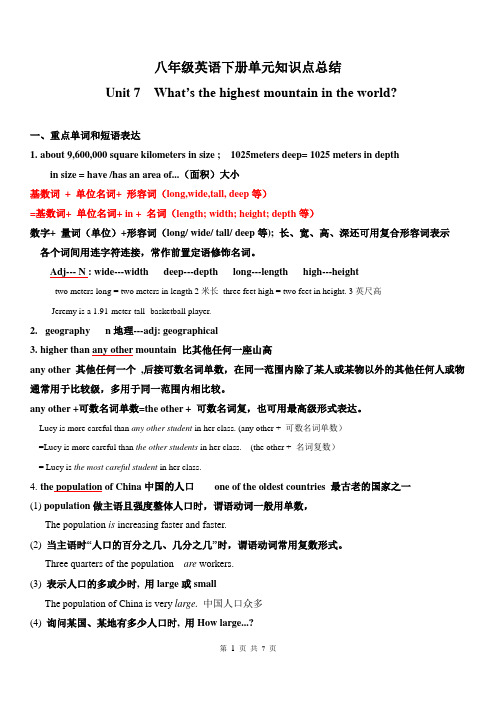
八年级英语下册单元知识点总结Unit 7 What’s the highest mountain in the world?一、重点单词和短语表达1.about 9,600,000 square kilometers in size ; 1025meters deep= 1025 meters in depthin size = have /has an area of...(面积)大小基数词+ 单位名词+ 形容词(long,wide,tall, deep等)=基数词+ 单位名词+ in + 名词(length; width; height; depth等)数字+ 量词(单位)+形容词(long/ wide/ tall/ deep等); 长、宽、高、深还可用复合形容词表示各个词间用连字符连接,常作前置定语修饰名词。
Adj--- N : wide---width deep---depth long---length high---heighttwo meters long = two meters in length 2米长three feet high = two feet in height. 3英尺高Jeremy is a 1.91-meter-tall- basketball player.2.geography n地理---adj: geographical3.higher than any other mountain 比其他任何一座山高any other 其他任何一个,后接可数名词单数,在同一范围内除了某人或某物以外的其他任何人或物通常用于比较级,多用于同一范围内相比较。
any other +可数名词单数=the other + 可数名词复,也可用最高级形式表达。
Lucy is more careful than any other student in her class. (any other + 可数名词单数)=Lucy is more careful than the other students in her class. (the other + 名词复数)= Lucy is the most careful student in her class.4.the population of China中国的人口one of the oldest countries 最古老的国家之一(1) population做主语且强度整体人口时,谓语动词一般用单数,The population is increasing faster and faster.(2) 当主语时“人口的百分之几、几分之几”时,谓语动词常用复数形式。
人教新目标八年级下册6-10单元中考重点知识
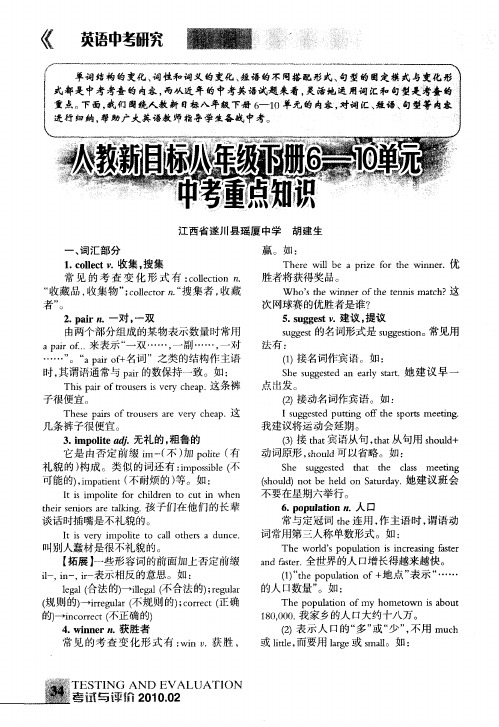
A N D V A LU AT N E
—
。 2
The po u ai n p lto of S ng i s i g r ha ha i b g e I
lgrhnta o ln 上 海 的人 口 比大 连 a e a ht f i . r t Daa 的多 。 ( 询 问 某 国 、 地 有 多 少 人 口时 , 用 3 ) 某 不 h w muh或 hw n , o c o mav 而用 “ w lg Ho re/ a bg b +h o uao f 地 点 ?或 “ h t i+ e tep p l in o+ t ” W a+ b+h ouao f地点 ?表 示 。如 : e teD plino+ t ”
、 0
:
e
e
Hale Waihona Puke a ”“…
…
。
r
e
.
h u g se ha h ls ei n 礼貌 的) 构成 。类似的词还有 : o i e 不 优 S e s g e td t t t e cas m e t g i sb ( mp s l 可能的1i aet 不耐烦的) , tn ( mp i 等。如 : ( ol n t e e nSt d . s u ) o b l o a ra 她建议班会 h d hd u y I si p l e f r c i r n t u n whe ti m oi o hl e o c ti t d n 不要 在 星期六举 行 。 te nos r tkn. 子 们在他 们 的长辈 his irae a ig 孩 re l 6 p p lt n 人 口 . o uai . o 谈 话时插 嘴是不 礼貌 的 。 常 与定冠 词 te h 连用 , 主 语 时 , 语 动 作 谓 I sv r m p lt o alo h r u e t i e y i oie t c l t e sa d nc . 词常用第 三人称单数形式。如: Th rd’ po u ai n i n rai at r e wo l S p lto si c e sng fse 叫别人蠢 材是很 不礼 貌 的。 n sr全世 界的人 口增长 得越来 越快 。 ae 【 拓展 】 一些形容词的前面加上否定前缀 adft . i ,n .r表示 相反 的意思 。如 : l i一 i 一 - ( “ ep plino 地 点 ” 示 “ 1 t o uao f+ )h t 表 …… l 。如 : la( e l合法的) ugl不合法的) eu r 的人 E数量 ” g 一i a( e ; gl r a The p puai fmy ho t wn i b ut o lt on o me o sa o ( 则 的) ie a ( 规则 的)cr C ( 确 规 一 r 1 不 r r ;or t正 c 100 0 我 家乡 的人 口大约 十八 万 。 8, . 0 的卜 cr c f i or t不正确 的) n e 4 win r . . n e 获胜者 n ( 表 示 人 口的 “ ” “ ” 不 用 muh 2 ) 多 或 少 , c 常见的考查 变化形 式有 : n 获胜 , wi . 或 lt , il 而要用 lg 或 s l te a e ma。如 : r l
人教新目标八年级下知识点

人教新目标八年级下知识点人教新目标八年级下学期的课程中,包含了很多有趣的知识点,让学生们可以更好地了解世界、学习知识。
下面就来详细介绍一下这些知识点。
一、科学技术在八年级下学期的科学课程中,学生们将学习很多科学技术方面的知识。
比如,他们将了解到电池的作用和种类,学会使用多米诺骨牌制作循环轨道,探究声音在空气和固体中的传播速度,并通过实验掌握测量技能等。
二、历史常识学生们在八年级下学期的历史课程中,将了解到很多有关世界历史的常识。
比如,他们将学习印度历史和文化,了解印度教、佛教等冲击世界的宗教;学习美国的经济体系和航天事业,探究美国历史上的一些重要事件等。
三、地理知识在八年级下学期的地理课程中,学生们将深入了解地球上的各种自然环境和人文环境。
他们将学习全球能源资源分布、地球上的气候带和美洲地理概况等内容,并了解到自然资源的保护和人口增长对环境的影响。
四、文学素养在八年级下学期的中文课程中,学生们将接触到更多文学作品。
他们将学习神话传说中的故事,了解古代文学和现代文学的区别,学会写记叙文、议论文、说明文和应用文等文体,并通过阅读名著提高自己的文学素养。
五、数学技能在八年级下学期的数学课程中,学生们将进一步掌握根据图像模式来表示函数、求解不等式,以及乘法公式、统计学知识等内容。
他们将学习到如何处理抽象问题,如何优化解题过程。
六、艺术美学在八年级下学期的音乐和美术课程中,学生们将认识到更多各种艺术形式。
他们将了解关于音乐的节拍、旋律、和声和节奏等,同时学会合唱、伴奏等歌唱技巧;在美术课上,他们将学习如何表现生活和自然,通过美术作品表达自己的情感和理念。
七、健康生活在八年级下学期的体育与健康课程中,学生们将学习健康的生活方式和身体保健的知识。
他们将了解到身体的运动和营养对健康的重要性,学会如何锻炼身体,及时处理身体不适,保证良好的心理健康。
以上就是人教新目标八年级下学期的知识点介绍。
希望学生们可以在学习的过程中,逐渐掌握这些知识,不断拓展自己的视野,认识世界,做出更好的自己。
八年级英语下册 Unit 3 Could you please clean your room短语、语法知识点汇总 (新版)人教新目标版

Unit 3 Could you please clean your room一、必背短语【教材内容解析】Section A1.Peter, could you please take out the rubbish? (P. 17)(1)Could you please...?意为“你能……吗?”,could在此并不是过去式,而是表示一种委婉的语气,please后接动词原形,肯定回答用Sure/Of course/Certainly,也可以用...can,不可以用...could;否定回答用Sorry...并给出理由,也可用...can’t/mustn’t。
---Could you please help me with my homework?--Sure./Of course./Certainly./Sorry, I can’t. I’m busy now.(2)take out意为“带出去”,代词作宾语时,要放在take和out之间。
The dog is noisy. Take it out.2.Could I at least finish watching this show? (P. 18)(1)at least表示“至少”,反义词为at most“至多”。
The ticket cost at least 200 yuan.(2)finish意为“完成、做好”,后接动词作宾语时,要用doing的形式。
When are you going to finish your work?3. Yes, because Mom will be back from shopping any minute now. (P. 18)be back意为“回来”,相当于come back,前者侧重指状态,后者侧重指动作。
She has been back for two days. You came back very late last night.4.And she won’t be happy if she sees this mess. (P. 18)mess用作名词,表示“杂乱、不整洁”,常用的短语为:make a mess“搞得一团糟”;in a mess“一团糟”。
新目标英语 八年级下册 Unit1-10单元 重点短语+句型
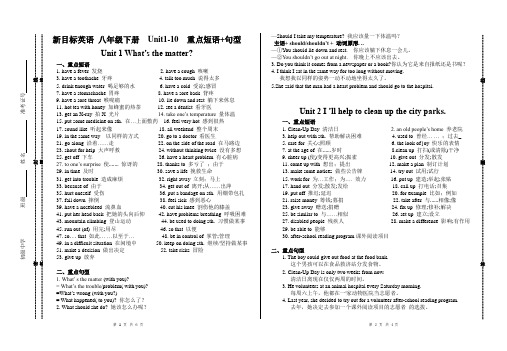
初级中学 班级 姓名 准考证号……………………………密……………………………………………………封…………………………………………线……………………… ……………………………答……………………………………………………题…………………………………………线……………………………………………………答……………………………………………………题…………………………………………线………………………新目标英语 八年级下册 Unit1-10 重点短语+句型Unit 1 What’s the matter?一、重点短语1. have a fever 发烧2. have a cough 咳嗽3. have a toothache 牙疼4. talk too much 说得太多5. drink enough water 喝足够的水6. have a cold 受凉;感冒7. have a stomachache 胃疼8. have a sore back 背疼9. have a sore throat 喉咙痛 10. lie down and rest 躺下来休息 11. hot tea with honey 加蜂蜜的热茶 12. see a dentist 看牙医13. get an X-ray 拍X 光片 14. take one’s temperature 量体温 15. put some medicine on sth. 在…上面敷药 16. feel very hot 感到很热 17. sound like 听起来像 18. all weekend 整个周末 19. in the same way 以同样的方式 20. go to a doctor 看医生21. go along 沿着……走 22. on the side of the road 在马路边 23. shout for help 大声呼救 24. without thinking twice 没有多想 25. get off 下车 26. have a heart problem 有心脏病 27. to one’s surprise 使....... 惊讶的 28. thanks to 多亏了 ;由于 29. in time 及时 30. save a life 挽救生命 31. get into trouble 造成麻烦 32. right away 立刻;马上 33. because of 由于 34. get out of 离开;从……出萍35. hurt oneself 受伤 36. put a bandage on sth. 用绷带包扎 37. fall down 摔倒 38. feel sick 感到恶心39. have a nosebleed 流鼻血 40. cut his knee 割伤他的膝盖41. put her head back 把她的头向后仰 42. have problems breathing 呼吸困难 43. mountain climbing 登山运动 44. be used to doing sth. 习惯做某事 45. run out (of) 用完;用尽 46. so that 以便47. so. . . that 如此… …以至于… 48. be in control of 掌管;管理49. in a difficult situation 在闲境中 50. keep on doing sth. 继续/坚持做某事 51. make a decision 做出决定 52. take risks 冒险 53. give up 放弃二、重点句型1. What’ s the matter (with you)?= What’s the trouble /problem( with you)? =What ’s wrong (with you?)= What happened( to you)? 你怎么了? 2. What should she do? 她该怎么办呢?—Should I take my temperature? 我应该量一下体温吗? 主语+ should/shouldn’t + 动词原形. ..—①You should lie down and rest. 你应该躺下休息一会儿。
人教版八年级下册各单元英语语法解析知识重点总结
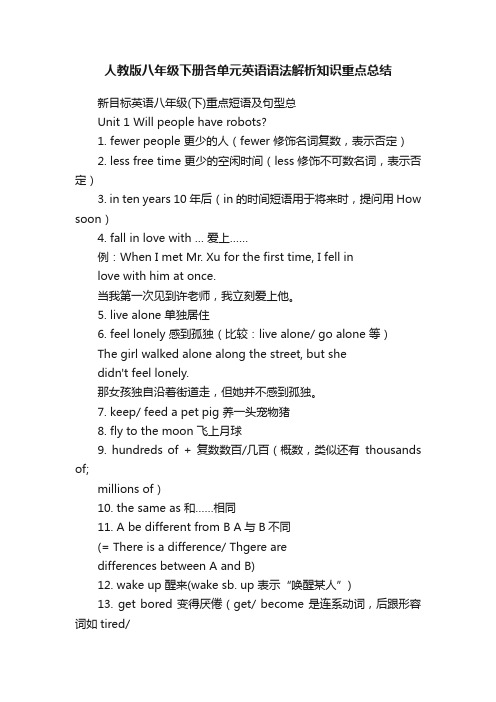
人教版八年级下册各单元英语语法解析知识重点总结新目标英语八年级(下)重点短语及句型总Unit 1 Will people have robots?1. fewer people 更少的人(fewer 修饰名词复数,表示否定)2. less free time 更少的空闲时间(less 修饰不可数名词,表示否定)3. in ten years 10年后(in 的时间短语用于将来时,提问用How soon)4. fall in love with … 爱上……例:When I met Mr. Xu for the first time, I fell inlove with him at once.当我第一次见到许老师,我立刻爱上他。
5. live alone 单独居住6. feel lonely 感到孤独(比较:live alone/ go alone 等)The girl walked alone along the street, but shedidn't feel lonely.那女孩独自沿着街道走,但她并不感到孤独。
7. keep/ feed a pet pig 养一头宠物猪8. fly to the moon 飞上月球9. hundreds of + 复数数百/几百(概数,类似还有thousands of;millions of)10. the same as 和……相同11. A be different from B A与B不同(= There is a difference/ Thgere aredifferences between A and B)12. wake up 醒来(wake sb. up 表示“唤醒某人”)13. get bored 变得厌倦(get/ become 是连系动词,后跟形容词如tired/angry/ excited 等)14. go skating 去滑冰(类似还有go hiking/ fishing /skating/ bike riding 等)15. lots of/ a lot of 许多(修饰可数名词、不可数名词都可以)16. at the weekends 在周末17. study at home on computers 在家通过电脑学习18. agree with sb. 同意某人(的意见)19. I don't agree. = I disagree. 我不同意。
- 1、下载文档前请自行甄别文档内容的完整性,平台不提供额外的编辑、内容补充、找答案等附加服务。
- 2、"仅部分预览"的文档,不可在线预览部分如存在完整性等问题,可反馈申请退款(可完整预览的文档不适用该条件!)。
- 3、如文档侵犯您的权益,请联系客服反馈,我们会尽快为您处理(人工客服工作时间:9:00-18:30)。
雪夏冰凝的空间新目标八年级下册 Unit 1 重点短语及句型总汇2009-08-09 14:40Unit 1 Will people have robots?重点短语及句型总汇1. fewer people 更少的人(fewer 修饰名词复数,表示否定)2. less free time 更少的空闲时间(less 修饰不可数名词,表示否定)3. in ten years 10年后(in 的时间短语用于将来时,提问用 How soon)4. fall in love with … 爱上……例:When I met Mr. Xu for the first time, I fell in love with him at once.当我第一次见到许老师,我立刻爱上他。
5. live alone 单独居住6. feel lonely 感到孤独(比较:live alone/ go alone 等)The girl walked alone along the street, but she didn't feel lonely.那女孩独自沿着街道走,但她并不感到孤独。
7. keep/ feed a pet pig 养一头宠物猪8. fly to the moon 飞上月球9. hundreds of + 复数数百/几百(概数,类似还有 thousands of; millions of)10. the same as 和……相同11. A be different from B A与B不同(= There is a difference/ Thgere are differences between A and B)12. wake up 醒来 (wake sb. up 表示“唤醒某人”)13. get bored 变得厌倦(get/ become 是连系动词,后跟形容词如 tired/ angry/ excited 等)14. go skating 去滑冰(类似还有 go hiking/ fishing / skating/ bike riding 等)15. lots of/ a lot of 许多(修饰可数名词、不可数名词都可以)16. at the weekends 在周末17. study at home on computers 在家通过电脑学习18. agree with sb. 同意某人(的意见)19. I don't agree. = I disagree. 我不同意。
20. on a piece of paper 在一张纸上(注意 paper/ information/ news/ work/ homework/ housework 等常考到的不可数名词)21. on vacation 度假22. help sb with sth/help sb do sth. 帮助某人做某事23. many different kinds of goldfish 许多不同种金鱼24. live in an apartment 住在公寓里;live on the twelfth floor 住在12楼25. live at NO.332,Shanghai Street 住在上海路332号26. as a reporter 作为一名记者27. look smart 显得精神/看起来聪明28. Are you kidding? 你在骗我吗?29. in the future 在将来/在未来30. no more = not … anymore 不再(强调多次发生的动作不再发生)31. no longer = not … any longer 不再(强调状态不再发生)32. besides(除……之外还,包括)与except = but(除……之外,不包括)33. be able to 与 can 能;会(be able to 用于各种时态,而 can 只能用于一般现在时态和一般过去时态中;have to 用于各种时态,而 must 只能用于一般现在时态)例如:① I have been able to/ will be able to speak two languages. (不可以用 can)② had to stay at home/ will have to (不可以用 must)34. be big and crowded 大而且拥挤34. be in college 在上大学35. live on a space station 住在空间站36. dress casually 穿得很随意;casual clothing 休闲服饰37. win the next World Cup 赢得世界杯;win award 获奖38. come true 变成现实39. take hundreds of years 花几百年的时间40. be fun to watch 看起来有趣41. over and over again 一次又一次42. be in different shapes 形状不同43. twenty years from now 今后20年本单元目标句型:1. What do you think life will be like in 1000 years?2. There will be fewer trees、more buildings and less pollution in the future. fewer;less 表示否定之意,分别修饰可数名词和不可数名词;more 二者都可以修饰。
3. Will kids go to school? No, they won't/ Yes, they will。
4. Predicting the future can be difficult.5. I need to look smart for my job interview.6. I will be able to dress more casually.7. I think I'll go to Hong Kong on vacation, and one day I might even visit Australia.8. What will teenagers do for fun twenty years from now?9. That may not seem possible now, but computers, space rockets and even electric toothbrushes seemed impossible a hundred years ago.本单元语法讲解:一般将来时1. 表示将要发生的动作或存在的状态。
本时态标志词:① 含 tomorrow; next 短语;② in + 段时间;③ how soon;④ by + 将来时间;⑤ by the time sb. do …;⑥ 祈使句句型中:or/ and sb. will do;⑦ 在时间/条件状语从句中,如果从句用一般现在时,主句用将来时;⑧ another day比较 be going to 与 will:be going to 表示近期、眼下就要发生的事情,will 表示的将来时间则较远一些。
如:He is going to write a letter tonight. He will write a book one day.2. be going to 表示根据主观判断将来肯定发生的事情,will 表示客观上将来势必发生的事情。
He is seriously ill. He is going to die. He will be twenty years old.3. be going to 含有“计划,准备”的意思,而 will 则没有这个意思,如:She is going to lend us her book. He will be here in half an hour.4. 在有条件从句的主句中,一般不用 be going to, 而多用 will。
如:If any beasts comes at you, I'll stay with you and help you.掌握了它们的这些不同,你就能很好的区分 be going to 与 will 了。
一般将来时常见的标志词① 含 tomorrow; next 短语;② in + 段时间;③ how soon;④ by + 将来时间;5. 祈使句句型中:or/ and sb. will do例:Be quick, or you will be late = If you don't be quick, you will be late6. 在时间/条件状语从句中,如果从句用一般现在时,主句用将来时(另见 Unit 5)雪夏冰凝的空间新目标八年级下册 Unit 2 重点短语及句型总汇2009-08-09 14:39Unit 2 What should I do?重点短语及句型总汇1. too loud 太大声2. out of style 过时的3. in style 流行的4. call sb. up = ring sb. up = call/ ring/ phone sb. 给……打电话5. enough money 足够的钱(enough 修饰名词时不必后置)6. busy enough 够忙 (enough 修饰形容词或副词时必须后置)7. a ticket to/ for a ball game 一张球赛的门票注意:the key to the lock/ the key (answer) to the question)/ the solution to the problem. 此处几个短语不能用 of 表示所有格8. talk about 谈论9. on the phone 用电话10. pay for 付款11. spend … on +sth. = spend … ( in) doing sth. 在……花钱12. It takes sb. sometime to do sth. 某人做某事花……的时间13. borrow … from 从……借( 借进来)14. lend … to 把……借给(借出去)15. You can keep the book for a week 你可以借这本书一周。
